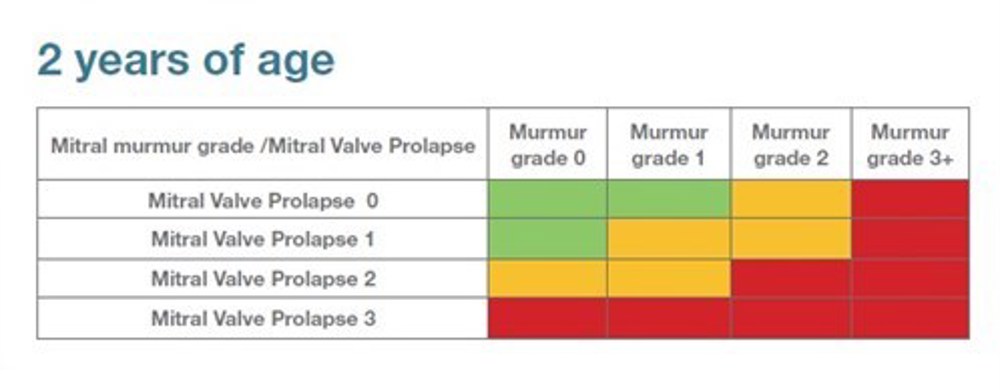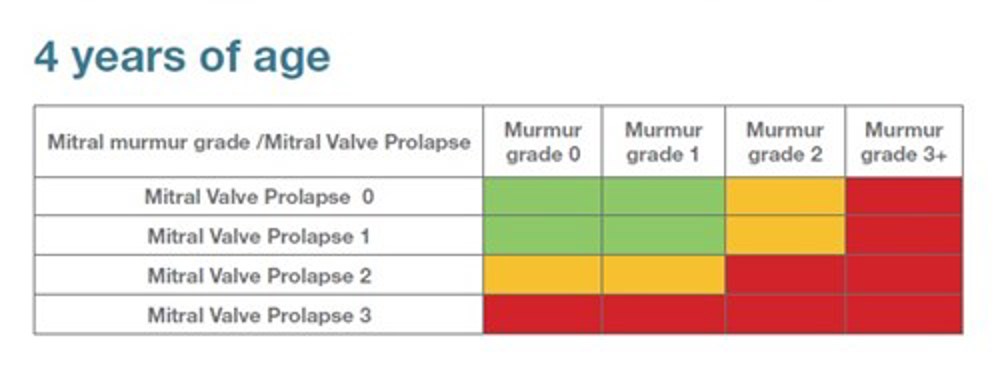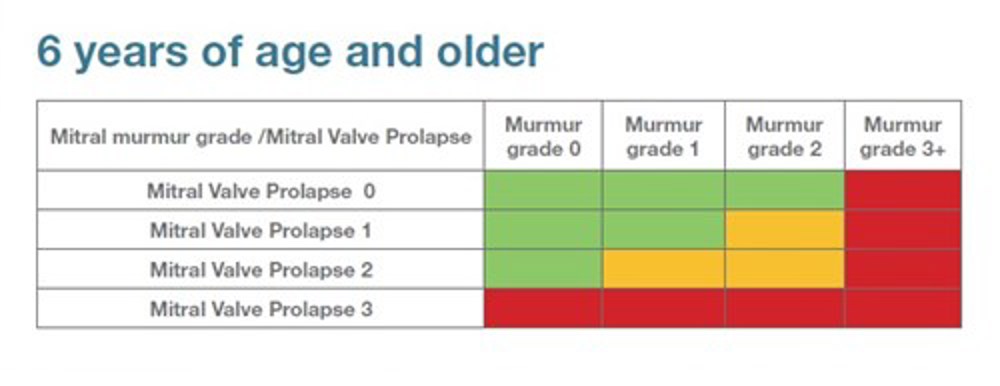
What is the scheme?
The Kennel Club Heart Scheme assesses Cavalier King Charles Spaniels for mitral valve disease and other potentially significant heart diseases.
The scheme advises owners if their dog is affected by heart disease and gives guidance to breeders on how to lower the risk of producing affected puppies. A number of approved cardiologists (vets specially trained in heart conditions) have been appointed to carry out heart grading on dogs.
What are heart murmurs and what is mitral valve disease?
A heart murmur is an unusual sound made by the heart during its cycle of beating and can be a sign of heart disease. Mitral valve disease (MVD) is a type of heart disease that is caused by one of the valves in the heart leaking. This leaking valve can get worse over time and can cause the heart to become enlarged and less effective.
Getting your dog assessed
At what age should my dog first be assessed?
Your dog must be at least 18 months old to participate in the scheme. To gain the maximum benefit from the scheme, dogs should ideally first be assessed at around 2 years of age and then re-assessed every two years. If you are thinking of breeding from your dog you should always have them graded first.
How much will it cost?
Each cardiologist will have their own assessment fee which may vary between cardiologists, so check the fee before making an appointment. The owner will pay the cardiologist the fee in full.
How do I book an assessment?
You can find your closest cardiologist below and contact them directly. Alternatively, please see the list below the map.
Please see below for a list of regional cardiologists or email our
Health and Breeding Support Team (The Kennel Club)team for details of group sessions. Please note that in most cases your local vet will not be able to assess your dog for this scheme.
| Location area | Name and email |
|---|---|
| Bristol | Kieran Borgeat |
| Bedfordshire | Monika Czerwinska |
| Cheshire | Joanna Dukes McEwan |
| Derbyshire | Vicky Ironside |
| Devon/Cornwall | Heart Vets |
| East Midlands | Sarah Smith |
| Hampshire | Luca Ferasin |
|
London and East of England |
|
| Midlands | David Fisher |
| Norfolk | Tom Robertson |
| North Wales & North West | Rachel James |
| North West | Emily Dutton |
| Northern Ireland | Julie Hamilton-Elliott |
| Scotland | Anne French |
| Scotland/Cumbria/North West | Hannah Stephenson |
| South Wales | Heart Vets |
| West Midlands (Solihull) | Chris Linney |
| West Midlands | Simon Swift Willows Veterinary Centre and Referral Service and Referral Service |
| West Midlands |
Fabio Sarcinella Willows Veterinary Centre and Referral Service and Referral Service |
| West Midlands |
Siddarth Sudunagunta Willows Veterinary Centre and Referral Service and Referral Service |
|
West Sussex |
|
| Yorkshire & North East | S L Roberts |
If you’ve experienced any difficulties contacting any of our cardiologists or booking an appointment, please report your issue here.
Group sessions
If you are organising group sessions, then it is likely that the cardiologist will charge a day rate for a group session. The cardiologist's invoice will need to be paid in full by the club or organisation organising the group session. It is important for those organising the session to confirm with the cardiologist the exact amount of appointments they are willing to offer for the day and the timings necessary for those appointments. The club are then advised to divide the cost to the owners that apply.
What do I need to bring to the assessment?
You will need to bring your dog’s registration certificate from The Kennel Club and microchip identification.
What happens during the assessment?
Your cardiologist will use two non-invasive techniques to check your dog’s heart. The cardiologist will begin by using a stethoscope to listen to your dog’s heart for signs of a heart murmur. They will use their findings to give your dog a murmur grade. After this they will carry out an echocardiogram to scan your dog’s heart valves and give a mitral valve prolapse grade. The cardiologist will also record other measurements on the scan which may be used for research purposes, but these will not be recorded on your test certificate.
The cardiologist will discuss your dog’s grading and will record the findings on an official form. You will receive a copy of the form. The assessor will keep a copy for their records and The Kennel Club will be informed of the result for online publication.
How often should my dog be assessed?
Your dog should have an assessment every two years to monitor any change, particularly if they are being used for breeding. If your dog has its first test under 4 years of age, the test certificate will expire on the dog’s fourth birthday. The 4-year-old test will expire on the dog’s sixth birthday etc.
What does my mitral murmur grade mean?
Your dog is assigned two grades. The first is a mitral murmur grade of 0, 1, 2 or 3+ which is based on standard protocols for grading mitral murmurs. A murmur is graded in relation to the intensity of the other heart sounds; the louder the murmur, the higher the grade. This grading is exactly the same as the ones used in other auscultation (stethoscope examination) schemes. If your dog has a murmur which is not considered to be due to mitral valve disease, then it will be noted separately to the mitral murmur grade in the comments box (e.g. innocent murmurs, murmurs of congenital heart disease).
What does my MVP grade mean?
The second grade is based on the degree of mitral valve prolapse (MVP) seen on the heart scan. MVP is ‘ballooning’ of the mitral valve secondary to a structural abnormality of the valve. This can happen before the dog has a murmur. The degree of prolapse will be measured and a grade will be given based on a standard protocol, with more significant prolapse resulting in a higher MVP grade.
Age and breeding advice
As mitral valve disease develops as a dog ages, dogs might develop a murmur or mitral valve prolapse as they get older. The ‘traffic light’ system therefore takes into account the age of the dog. A dog with higher murmur and/or prolapse grades as a young dog would be considered more of a concern than an older dog with the same grades.
Breeding guidelines
The breeding advice based on this scheme varies depending on the two grades that your dog receives, and also the age they are tested.
Green
These dogs have the lowest risk of developing clinical MVD and the lowest risk of passing the condition on to any offspring.
Amber
These dogs have a higher risk of developing and/or passing on the condition to offspring. Only amber dogs that are in excellent health, and have good results from other screening schemes, may be used cautiously for breeding, and only with a mate categorised as green, preferably at 4 years of age or older.
Red
These dogs have the greatest risk of passing the condition to offspring and so should not be used for breeding.
Please note that dogs considered by the cardiologist to have an innocent murmur (i.e. a murmur that is not related to MVD or another significant heart defect) should be scored as green under the traffic light system. Dogs considered to have another significant heart defect (e.g. congenital heart defect) should be scored as red under the traffic light system. This will be clearly stated on your testing certificate. This advice is summarised in the following tables. The advice may change, however, as further research is undertaken.



The way that MVD is inherited is not fully understood and is not always entirely predictable. Using the traffic light system above can help you reduce the chances of breeding puppies affected by heart disease. However, even if used responsibly, this guidance cannot guarantee that a puppy from two “green” parents will be free from MVD.
Find another dog's results
Our Health Test Results Finder can help you find other health screening and DNA tests results that we record. This tool can help you make informed decisions, whether you're a breeder trying to find a suitable healthy mate for your dog, or a puppy buyer wanting to know more about the health of a puppy's parents.
Making balanced breeding decisions
As well as considering the implications of this heart scheme, there are other equally important factors to consider when deciding whether two dogs should be mated together, such as temperament, genetic diversity, conformation, other available health test results, the general health of the dogs, etc. Your breeding decisions should always be well balanced between and take into consideration the qualities and compatibility of both the sire and dam that you are considering.
CKCS Heart Scheme statistics
CKCS Heart Scheme statistics
Questions and answers
Information for vets
If you’re a veterinary cardiologists and wish to become involved, please contact the Veterinary Cardiovascular Society for more information.
What happens with my result?
Your dog’s grades will be recorded on The Kennel Club’s database and will be published in one or more of the following:
-
The Breed Records Supplement
Can I appeal my dog’s grade?
Correspondence address and contact information
Health Results Appeal
Breeder Services Dept.
The Kennel Club
1-5 Clarges Street
Piccadilly, London
W1J 8AB
Experienced an issue with the Heart scheme?
If you have experienced an issue with The Kennel Club Heart scheme for Cavalier King Charles Spaniels, please complete this form to report the issue. Your feedback is very important to us so we can improve our services for the future.
